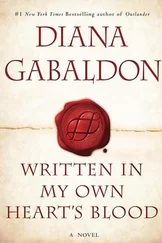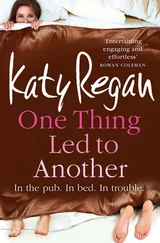But he shakes his head. He doesn’t want to. He won’t. It’s too painful for him to believe that their father’s legacy of violence has infected this sister just when he’s reminded of how much he loves her.
“I need to get some sleep. Tomorrow’s a school day. Do you think you can go back to bed?”
“Not now,” Ellen says, clearly disappointed that Jamie is bailing out of this conversation.
He hands her the remote from the living room coffee table. “Knock yourself out, only keep the volume low.”
“Yes, sir.”
She watches Jamie walk down the hall and hears him enter his bedroom. She needs to slow down, she tells herself, or he won’t hear her and she hasn’t even gotten to the difficult part yet.
WHEN JAMIE GETS HOME FROM SCHOOL, HE finds that Ellen has decorated his house. There are fresh flowers in vases he doesn’t recognize on the dining room table and the bookshelf in the living room. There’s a deep blue bowl piled high with symmetrical yellow lemons on the breakfast bar, the contrast of colors somehow perfectly right. And the living room couch, a deep utilitarian forest green, now boasts striped and patterned pillows in corresponding hues of yellow, blue, and cream.
He stands with his back against the front door and takes it all in, briefcase in hand crammed with more student essays.
“They’re all removable if you don’t like it,” Ellen says, coming in from the patio. Jamie gets a wave of cigarette smoke before she closes the sliding glass door behind her. “The flowers will die, the lemons will rot, and the pillows can be stashed in a closet.”
“Well, there’s a happy thought.”
“I just mean, this is all temporary if you need to go back to the monk’s cell you favored before.”
“It looks nice, Ellen.”
And she grins at him, relieved. “Good.”
They look at each other— What’s next? “I usually take a run when I get home …?” He lays it out there as a question.
“Go,” she says, “I’m cooking you dinner.”
“You don’t have—”
“Go—”
IT’S ON JAMIE’S RUNS THAT HE SORTS things out in his life. He takes a route that follows the water, passing a few other runners, maybe a mother or two with a stroller, or a couple of people walking their dogs, but that’s fine because most simply nod and he can avoid eye contact and keep running.
What does he think about this impromptu visit by his sister? On the one hand, she seems to be doing so much better, and that cheers him. She’s laughing and has that blunt honesty he always admired. On the other hand, she seems to be on a mission. Is that crazy? Does he need to be saved? Maybe from the outside it looks as though his life is sparse, barren even. He’s sure many people see it that way, but from the inside of this life he’s constructed a continent away from the turmoil of his family, the choices he’s made feel lifesaving.
Of course, there’s been a price to pay. And there are times when he aches with the losses he readily acknowledges. Those brothers who once felt like his second selves would never embrace this West Coast Jamie. And he knows it’s his lack of nerve that has kept his friendships here at the most superficial of levels. Something happens when you shut down , Jamie thinks as the path curves and continues around the bay. And the fact that he’s single, the fact that the women in his life up and leave him — he takes responsibility for that as well. They want more. So does he, but he knows that what they want is locked too far away to give.
Yes, there’s plenty Ellen could latch onto in this campaign she seems to be embarked upon. Will she listen? That’s the question he asks himself. Will she believe him when he assures her he sees the perimeters of the bargain he’s struck with himself and he’s made peace with them?
• • •
WHEN HE OPENS THE FRONT DOOR forty-five minutes later, sweaty and winded, it looks like Armageddon in his kitchen. Dirty pots are piled in the sink and across the countertops. Does he own all those or did Ellen buy some? Used plates and bowls are piled on every available surface and the floor. The bright red skins and pulp of tomatoes are smeared across a wooden chopping board like bloody entrails. Part of a chicken carcass rests, inexplicably, on his breakfast bar next to bowls of mussels and shrimp. On the stove some kind of sausage — chorizo, Ellen tells him later — is sizzling away at too high a heat and suddenly his smoke alarm goes off with a deafening shriek. And in the middle of all this, Ellen turns around, grinning with manic goodwill, and greets him, “Welcome to paella Espagnia!”
“Turn the burner off!” Jamie shouts.
“What?!”
And he does it himself, switching off the gas, moving the frying pan away, and then ripping the batteries out of the smoke alarm. The sudden quiet is like a slap in the face.
Ellen sneaks a quick peek at her brother’s face and knows she has to quickly salvage this. “I had it all under control until that damn thing went off.”
“That ‘damn thing’ goes off when you’re in danger of burning the whole place down.”
Ellen takes a deep breath. She doesn’t want this evening to start off with an argument. She gathers her calmness around her with a second deep breath. Firmly, without rancor, she tells him, “Go take a shower and I’ll finish up here. You’ll be amazed when you get back.”
He grunts and goes.
When he comes out of his bedroom twenty minutes later, his black hair wet, sleeked back and curling around his neck, barefoot, wearing a pair of comfortable jeans and an old T-shirt, he sees a large platter of just-finished paella resting on the dining room table. It smells amazing. New straw placemats hold his old white dishes. Patterned napkins Ellen must have also bought — Jamie would never buy anything with a pattern — finish the place settings. A bottle of red wine and a round loaf of crusty bread he recognizes from Sweet & Savory take up the middle of the table. It all looks so sumptuous, so lovingly prepared, that his heart melts. He scrupulously avoids looking into the kitchen.
“Wow,” he says softly.
“Sit down,” Ellen says, “I’m going to feed you.”
And she does. She spoons out the paella, cuts the bread, pours him some wine. He feels taken care of in a way he hasn’t since Nicole left three years before.
When they were first dating, Nicole would cook for him, but by the time the relationship was in trouble, six months later, the cooking had stopped. There is no upside , she had told him, to giving to someone who isn’t giving back .
The thing is, he was giving, only not nearly enough for most reasonable people. Why didn’t he confide in her, she asked, or “share his feelings” about anything important? He couldn’t explain beyond the imperfect and inadequate “That’s how I am.”
He wouldn’t agree to have her move in, and he needed to be alone too many nights a week for her to feel truly wanted. At first she had thought she’d win him over; hence the cooking and the acquiescence to his need for nights alone. But when nothing progressed, when she felt as though they were still in week three of their dating, she began to complain and then push him to argue, but he wouldn’t. He knew what was coming and he wouldn’t try to talk her out of it. He simply shook his head when she told him she was leaving.
“Say something!” she threw at him. “Argue with me. Tell me you need more time. Convince me there’s really a loving, giving Jamie trapped in old habits! Speak to me! I’m walking out the door here, Jamie.”
“I understand” is what he said so quietly she almost missed it.
She stared at him in disbelief and then, when he didn’t say another word, the sorrow that flooded her pretty face made him turn away. “Pathetic” was the last word he heard before the slam of the front door.
Читать дальше












